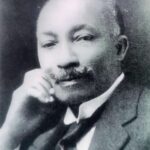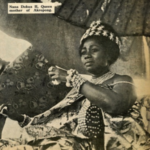MATEWOS, ABUNA
- 3 Min Read
Abuna Matewos (circa 1842-December 4, 1926), was the Metropolitan of Ethiopia (head of the Ethiopian church) and an influential councillor of Emperor Menilek II [reigned 1889-1913].

PHOTO CAPTION: Abuna Matewos SOURCE: EA Library
He was an Egyptian by birth, and received his ecclesiastical education and was ordained as a monk at one of the monasteries founded in Egypt by St. Pachomius (4th century). He and two other bishops accompanied Archbishop Petros to Ethiopia in 1881, at the request of Yohannes IV, who reigned from 1872-1889. Yohannes assigned Matewos to Menilek, then king of Shawa, and retained the services of the Archbishop for himself.
When Yohannes IV died in 1889, Abuna Matewos anointed Menilek as emperor of Ethiopia, and urged the people to rally behind him, threatening to excommunicate from the Ethiopian Orthodox Church all those who would secede. He also celebrated the marriage of Menilek and his consort Taytu Betul in 1883. A conflict developed, however, with Archbishop Petros, who had served under Yohannes IV, and who maintained before Menilek that he was still archbishop over Ethiopia.
The emperor settled the question by dividing Ethiopia into two archdioceses, over each of which a separate spiritual head would have jurisdiction. Eventually, after correspondence with Patriarch Cyril of Alexandria, he appointed Abuna Matewos as sole archbishop.
Abuna Matewos accompanied the emperor on all his journeys and campaigns, including the campaign against the Italians which culminated in the Ethiopian victory at Adwa in 1896. He also acted as his adviser on international affairs. In 1902 Matewos visited Russia on a politico-religious mission, and was decorated by the Tsar.
When, in 1907, Menilek introduced his ministerial reforms, Matewos became Minister of Education for three years on the grounds that education was inseparable from religion. In 1910-1917, during Menilek’s illness and after, Matewos was involved in domestic politics. In 1909 the emperor had proclaimed his grandson, Lej Iyasu Mickael, who was a minor, as his heir presumptive.
Abuna Matewos confirmed the decree by uttering words of excommunication and curses on all those who would disobey it. When the emperor became paralysed in 1910, a regent was appointed to run affairs of state. The Empress Tayta Betul, wife of Menilek, nevertheless persisted in wielding power.
The bishop, however, collaborated with the nobles in removing the empress from the political arena by joining the threat of excommunication to the threat of force. He also continued to act as a mediator between the prince and some of the dissatisfied chiefs. But he finally sided with the chiefs and released them from their oath of office to the heir presumptive, who was subsequently deposed in 1916. Early the following year Abuna Matewos anointed Menilek’s daughter, Zawditu as empress.
Abuna Matewos’ popularity and influence began to wane as he grew older and became involved in trifling political matters. He was criticised for his obstinancy and his anti-Western attitude in cultural affairs. After 1922 he fell ill, and on the recommendations of his doctors lived in Egypt, Jibuti, and Dire Dawa until his death in December, 1926.
BAIRU TAFLA




